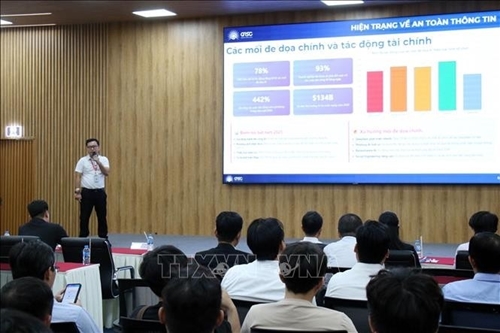The workshop, co-organized by the Quang Trung Software City (QTSC) and the Ho Chi Minh City Computer Association (HCA), aimed to review current AI application models, thereby improving digital capabilities, strengthening cyber defense, and ensuring the safety of cyberspace for both organizations and the national digital infrastructure.
    |
 |
|
Nguyen Thanh Lam, head of the Quang Trung Software City (QTSC)'s Cybersecurity Centre, speaks at the workshop. |
According to Nguyen Thanh Lam, head of QTSC's Cybersecurity Centre, a key concern is the sharp increase in AI-powered attacks, noting that 67.4% of phishing attacks in 2024 involved the use of AI. However, awareness remains limited, with 66% of organizations recognizing AI as a major disruptor, but only 37% having protective measures in place.
Lam outlined several emerging threats, including the rapid growth of deepfake technology, which increased tenfold between 2022 and 2023, with basic deepfakes now created in just 45 minutes. AI-based phishing is also becoming increasingly sophisticated, leveraging machine learning (ML) to craft personalized content. Other threats include the automation of code encryption and evasion of endpoint detection and response (EDR) systems, as well as the use of AI to analyze user behavior and design targeted attack scenarios.
Statistics from the Ministry of Science and Technology revealed that by the end of 2024, Vietnam had nearly 74,000 digital technology enterprises, a year-on-year increase of 10.1%, that contributed around 11% to the national GDP. AI-powered solutions are being widely applied in management, production, and operations, underlining the far-reaching impact of the technology across all areas of life.
Tran Huu Dung, Director of QTSC and Vice Chairman of HCA, said that alongside the exceptional opportunities brought by AI, there are increasingly serious cybersecurity threats. He noted a rise in the scale and sophistication of attack campaigns, particularly those targeting critical information systems in sectors such as telecommunications, energy, finance, and logistics.
A report from Fortinet in June revealed that automated scanning attempts had surged to 36,000 per second, a 17% increase from the previous year. Alarmingly, 42% of these were account takeover attacks, and leaks involving 1.7 billion sets of credentials. In Vietnam, data from the National Cybersecurity Association showed that 659,000 cyberattacks were recorded in 2024, affecting approximately 46.15% of government agencies and enterprises.
Dung emphasized that digital transformation must be integrated with security and operational optimization. He also mentioned that the use of AI not only allows businesses to process data more intelligently but also enables them to address increasingly sophisticated cyber threats.
Source: VNA